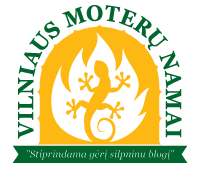Establishment and the Beginning of Activities
Association Vilnius Women’s House (VWH) was created by an informal group of women, active in 1990 – 1993. The Association was established by General Meeting of its’ members and registered on March 25, 1993. Vilnius Women’s House is a feminist organisation, active in the field of protection and enforcement of women’s human rights.
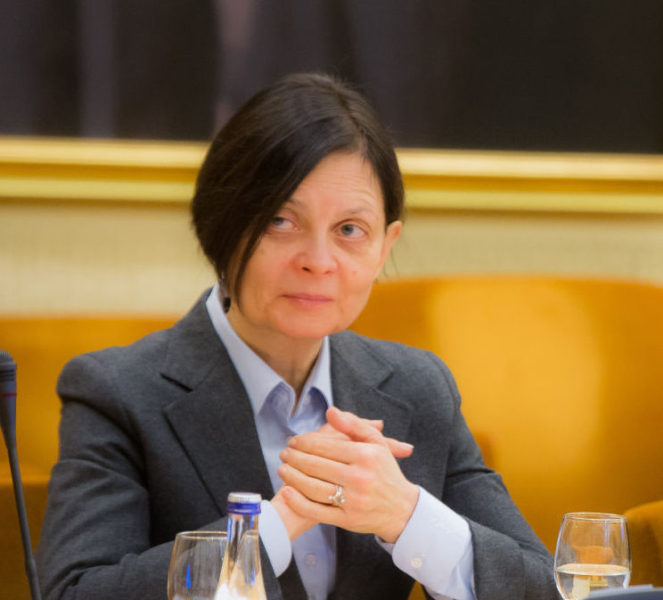
Lilija Henrika Vasiliauskienė, the president of the Association Vilnius Women’s House
In September of 1995, the leader of the organisation Lilija Henrika Vasiliauskienė participated in UN Fourth World Conference on Women in Beijing, China. During Nordic Women’s Crisis Centre movement workshop, after sharing ideas on establishing a crisis centre in Vilnius, women from Nordic countries had offered their support and cooperation. Thus, in autumn of 1996 the first Crisis Centre for women experiencing domestic violence and abuse was opened. It was the first NGO run Crisis Centre for the victims of gender–based violence not only in Lithuania, but in the three Baltic States. The Crisis Centre in Vilnius came to life as a result of international women’s solidarity and their successful collaboration – through mediation of Norwegian women’s NGOs a Norwegian government’s challenge grant had been received that gave a positive start for the Crisis Centre in Vilnius.

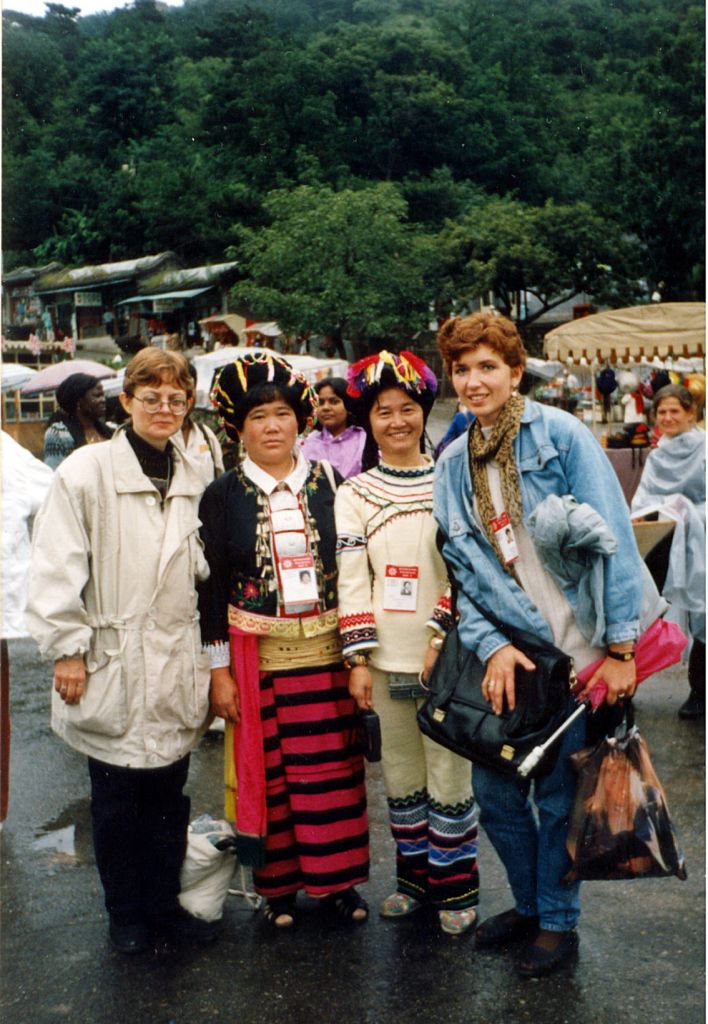
Since 1997, the Association carries out regular volunteer training programme, which was created in cooperation with Nordic women’s organisations. The ongoing intervision – supervision and self – support group for the volunteers is active at the premises of VWH Crisis Centre.
Membership in WAVE
Since 1998, VWH is a member of WAVE (Women Against Violence Europe) network, and since 2004 – it’s Focal Point in Lithuania. In 2007, Association Vilnius Women’s House organised the 9th International WAVE Conference “Stop Violence Against Women” that was held in Vilnius, Lithuania. Women activists from 20 European countries as well as the United States of America were among the participants. In 2010 – 2011, in cooperation with WAVE experts, Association Vilnius Women’s House actively joined drafting process of CoE Istanbul Convention (2011). As in 2013 – 2014 WAVE decided to register as an official entity, VWH president Lilija Henrika Vasiliauskienė joined the Task Force for drafting the Statute of the organization. The Task Force was also actively engaged in shaping the Network’s future policy.
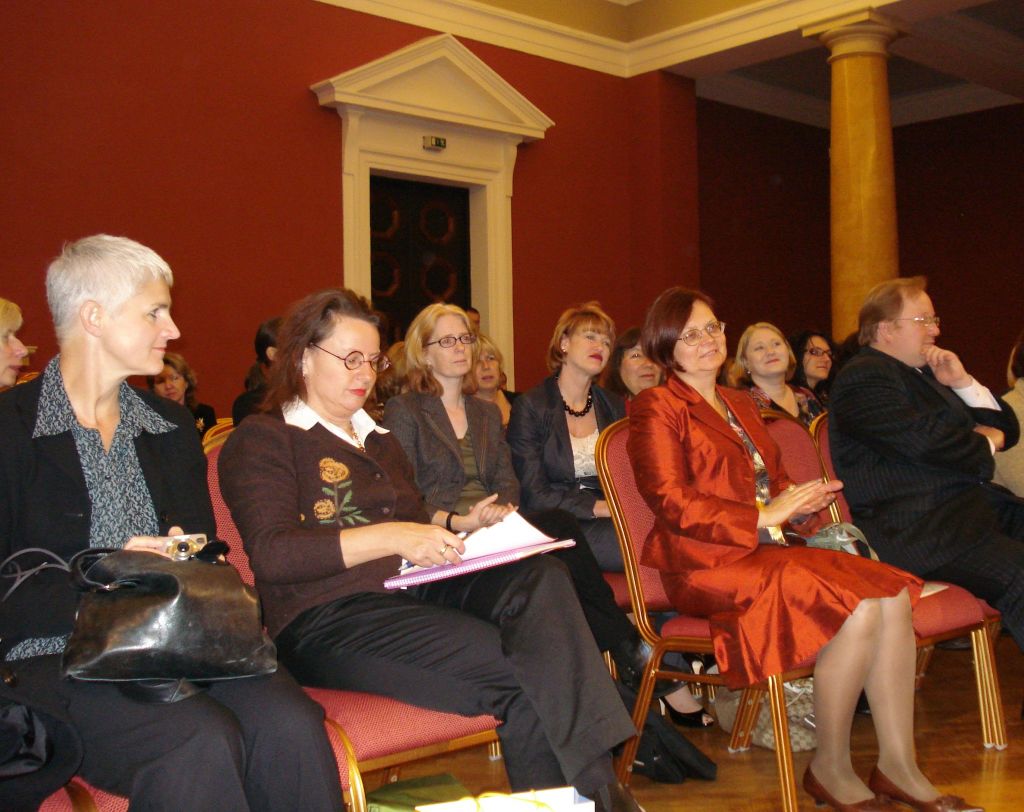
The Prime Minister Award
In 2003, Association Vilnius Women’s House received an award from Algirdas Brazauskas, the Prime Minister of the Republic of Lithuania, as the most successful non-governmental organisation (NGO) working in the field of combating violence against women. In the official Lithuanian Government Report on progress of overcoming all forms of discrimination against women, published in 2004, Vilnius Women’s House is named as NGO that effectively cooperates with governmental bodies on Government’s programmes implementation. The Association was highlighted as the best practices example.
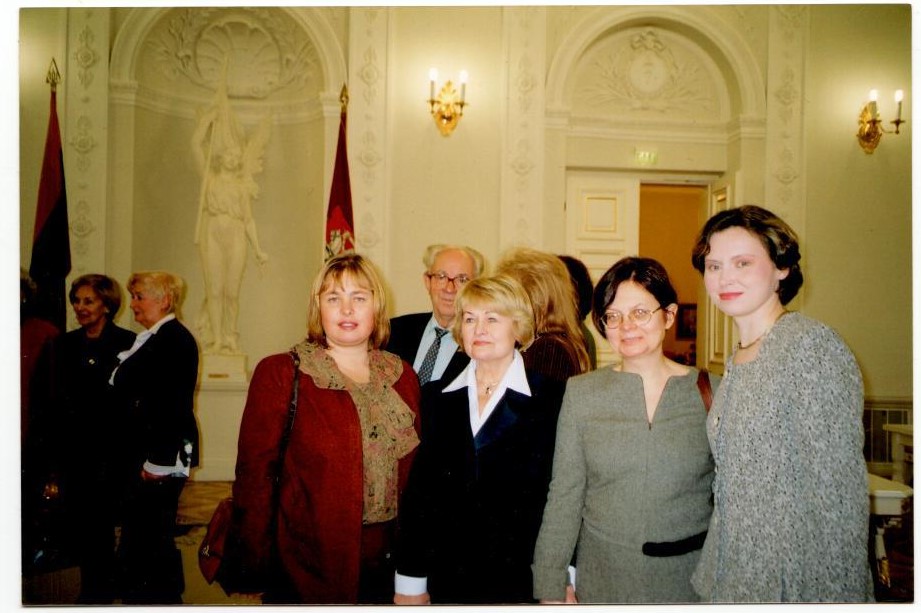
The IV Congress of Lithuanian Women (CLW)
Vilnius Women’s House was one of the organizers and ideologists of the IV Congress of Lithuanian Women (2004 – 2005). The Association suggested Beijing Criteria, based on the Beijing Platform for Action, for the evaluation of the progress of the Lithuanian women over the period of 15 years of Lithuanian independence. 14 critical areas of concern were selected for the evaluation. During the period of preparation, Vilnius Women’s House also acted as the Secretariat for the Congress. At the IV CLW, Vilnius city was represented by more than 60 most active women from 37 non-governmental organizations. Representatives from 42 women’s organizations were involved in preparations for the Congress.
Held on 26th of August, 2005, the IV Congress of Lithuanian Women had an important role in the development of Lithuanian democracy. The cooperation among women’s organizations while getting ready for the event became a school of democracy. The work done together laid a solid foundation for trust, solidarity, respect for diversity and matured women’s organizations for further cooperation in pursuit of public interest objectives. Building success on the experience of the Congress, in 2006 VWH together with other women’s NGOs initiated the establishment of National NGO Coalition Woman’s Rights are Human Rights (Coalition). The Coalition unites Lithuanian civic women’s organizations working in the field of combating violence against women and women’s human rights protection. The main objective of the Coalition is to ensure that women’s human rights to its full extent are part of Lithuanian political agenda.
National NGO Coalition Woman’s Rights are Human Rights
October 16, 2006 marks the creation of the National NGO coalition Woman’s Rights are Human Rights. Coordinators of the IV Congress of Lithuanian Women, representing women’s organisations from seven regions of Lithuania, gathered in Kaunas and expressed their willingness to continue working together and established the Coalition.
This Coalition is a form of open civic non-political self-organisation of Lithuanian women community, which aims to coordinate efforts in achieving actual implementation of the Resolution of the IV Congress of Lithuanian Women.
Since the establishment of the Coalition and up until now, VWH acts as the Coalition’s Secretariat.
The title Woman’s Rights are Human Rights emphasises that the Coalition founders consider women’s issues first and upmost as the human rights’ issues rather than social problems. The Resolution of The IV Congress of Lithuanian Women declares that during the 15 years of Independence Lithuanian women united by non-governmental organisations have been actively involved in restoring democracy and development of civic society. They have become competent actors in varies fields of social, political and cultural life of Lithuania, and ready for further promotion of women’s rights as universal and indivisible human rights. Women comprise more than half of Lithuanian society and are more educated than Lithuanian men; however, they are not sufficiently represented in the decision making on the State level. Therefore, it is necessary to eliminate all forms of discrimination against women and provide equal opportunities for women to act freely in the public sphere. The founders also consider it necessary to separate women’s as social group’s issues from those of so called vulnerable groups, and treat them in the context of protection and promotion of human rights (IV CLW Resolution).
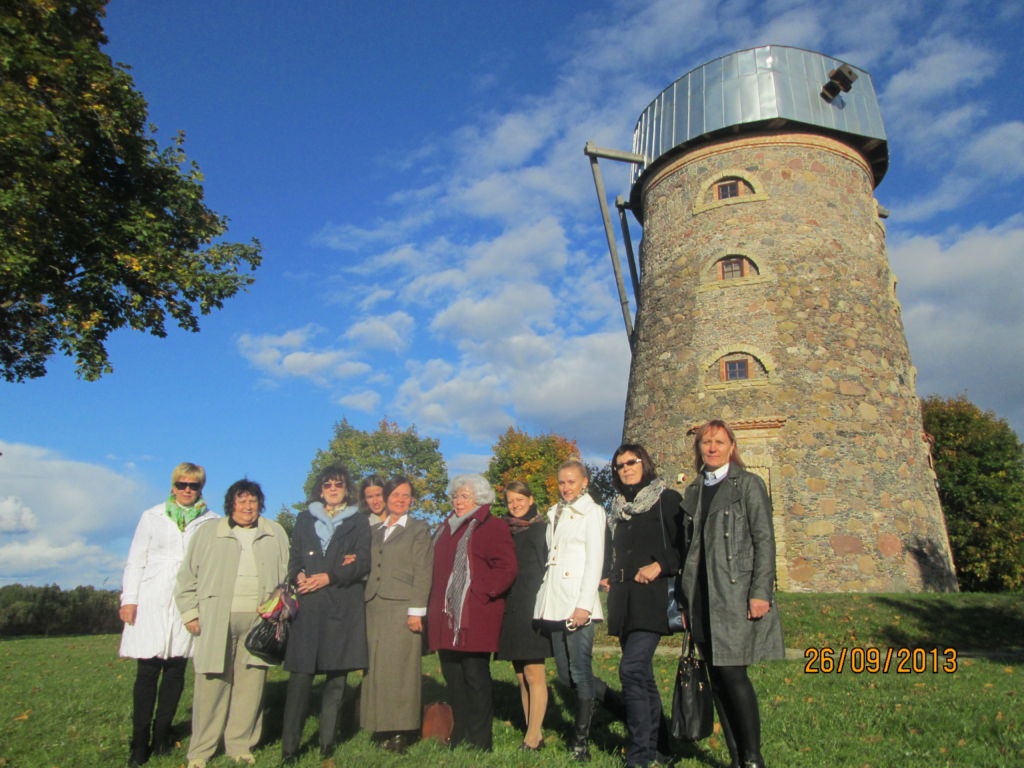
In 2007 – 2011, in accordance with Beijing Platform for Action acknowledging that violence against women both violates and impairs or nullifies the enjoyment by women of their human rights and fundamental freedoms (UN, 1995), the Coalition declared combating violence against women as its main strategic goal. In pursuit of this objective and due to productive cooperation with the members of Women’s Parliamentary Group, in particular Dalia Kuodytė, Marija Aušrinė Pavilionienė, Ona Valiukevičiūtė and others, in 2010 a Working Group under Parliament’s Human Rights Committee, was assembled. The Working Group’s objective was to draft the Protection from Violence in Immediate Surroundings Law. The president of Vilnius Women’s House Lilija Henrika Vasiliauskienė, also representing the NGO Coalition Woman’s Rights are Human Rights, was a member of this Group. On May 26th, 2011, the Law prepared by the Working Group was approved by the Lithuanian Parliament with absolute majority (88 members having voted for, 1 – against, and 2 – abstained).
Protection from Violence in Immediate Surroundings Law:
preparation, commencement, and implementation
Invoking the best world practices, first of all the Austrian model, an initiative was taken to prepare a law to protect women from domestic and intimate partner violence (DV/IPV). The Law declared family violence what in reality it was – a crime and human rights violation. The Coalition, that was consistently working towards the implementation of the IV Resolution of the Congress of Lithuanian Women was the main protagonist of initiation, preparation, and passing throw the Law. The Coalition was actively involved in implementation of the Council of Europe (CoE) Campaign to combat violence against women, including domestic violence against women (2006 – 2008), forming a National Task Force for its implementation. In cooperation with CoE Information Office in Vilnius and its head dr. Marija Prokopčik, important information materials have been translated and published, including Guidelines for a Parliamentarian on Combating Violence against Women: Strategy and Tactics. The information materials have been distributed to each member of the Parliament, as well as to the Ministries. Implementation of the Campaign proved to be a significant step towards the adoption of Protection from Violence in Immediate Surroundings Law. Thus, by the effort of women’s NGOs, on May 26th, 2011, the Protection from Violence in Immediate Surroundings Law was adopted. The Law corresponds with the world best practices: it criminalises violence in immediate surroundings, which is nothing other than men’s violence against women; violence in immediate surroundings is proclaimed as violation of human rights; the State assumes responsibility for preventing violence in immediate surroundings and for providing specialised complex help and support for the survivors. Specialised Help Centres have been established giving the priority for non-governmental organisations as NGO run, government funded bodies.
Specialised Help Centre (SHC)
Since 2012, Vilnius Women’s House assumed the functions of the Specialised Help Centre for Vilnius city. SHC works in close cooperation with the Police, Child’s Rights Division and other organisations and institutions. An important part of Vilnius Women’s House activities are advocacy and active monitoring of governmental bodies. International women’s movement is an important resource for the Organization in its efforts to improve Lithuanian legal framework for combating violence against women, influence political decisions and implement progressive practices.
After adoption of Protection from Violence in Immediate Surroundings Law in 2011, the number of referrals to police is constantly increasing: from 18 000 in 2012, to almost 40 000 in 2015. It is evident that more and more people trust in the State and its ability to provide protection from violence in their homes.
Organisation’s Activities at National Level
Since 1996 Association’s Vilnius Women’s House Crisis Centre continuously provides specialised complex help for women experiencing domestic violence; it also performs an important work of crisis’ intervention and prevention, organises educational seminars for professional groups, acts as a methodical centre for other NGOs in the field. In 2002, the first free of charge national help line for women experiencing domestic violence and abuse was established at VWH Crisis Centre and it operated up until 2012. It was available not only for women in Vilnius, but for women all over the country. The support was provided with the help of volunteers who underwent the special Training Programme for Volunteers.
As NGO expert, VWH participates in preparation and implementation of important governmental programmes, such as Programme for Prevention and Control of Human Trafficking and Prostitution 2002 – 2004. Within the framework of this programme, at the request of women’s NGOs, a historical regulation was adopted, which criminalised sex buyers. Lithuania became the next country after Sweden to have adopted this important legal provision which transfers the stigma from women onto men as sex buyers. Experts from VWH participated directly in preparation of the first Governmental Strategy to Combat Violence against Women 2007 – 2012. At the request of the Lithuanian Ministry of Social Security and Labour, VWH had prepared Methodical Guidelines for the NGO Teams Answering the National Help Line for the Victims of Domestic Violence.
In five years of the implementation of the Law (2011), a solid foundation was laid for the unified specialised help for victims of domestic violence throughout the country. The network of regional SHCs has been created. The progressive model of cooperation between NGOs and the Government was established – NGOs run SHC receive regular funding (though rather small) from the State according to Governmental Programme for Specialized Help Centres. In 2015, by joint efforts of women’s NGOs and Lithuanian Ministry of Social Security and Labour (LMSSL) the new SHC Operating Description was prepared. This allowed to unify practices in all help centres, as well as increase the qualification of SHCs’ employees and volunteers by providing them with additional specialized training. The association Vilnius Women’s House provided the training that was procured by LMSSL. Following the tender by LMSSL, in 2016 VWH prepared the Methodical Recommendations for the Employees and Volunteers of Specialized Help Centres Providing State-Guaranteed Specialized Complex Help and Support for the Victims of Domestic Violence (…). These Methodical recommendations emphasize the demand for victim’s empowerment and respect for her needs and legitimate expectations, as a core requirement for help provision not only in SHCs but as well as in other institutions. In 2015 – 2016, the VWH implemented a project Community mobilization and promotion of volunteering in response to gender-based violence which was funded by European Economic Area (EEA) Grants. By the implementation of this project the members of Coalition and other NGOs were provided with the new opportunities for networking and cooperation. Enhanced capacity for advocacy, yielded perfect results, one of them being the increase of SHCs’ network funding for the period of 2016 – 2018 by 2.4 times. Among other activities, the unified training programme for SHC was created, Pilot project of Coordinating Centre of SHCs network was implemented, and awareness about association Vilnius Women’s House and the Coalition Woman’s Rights are Human Rights has been raised.
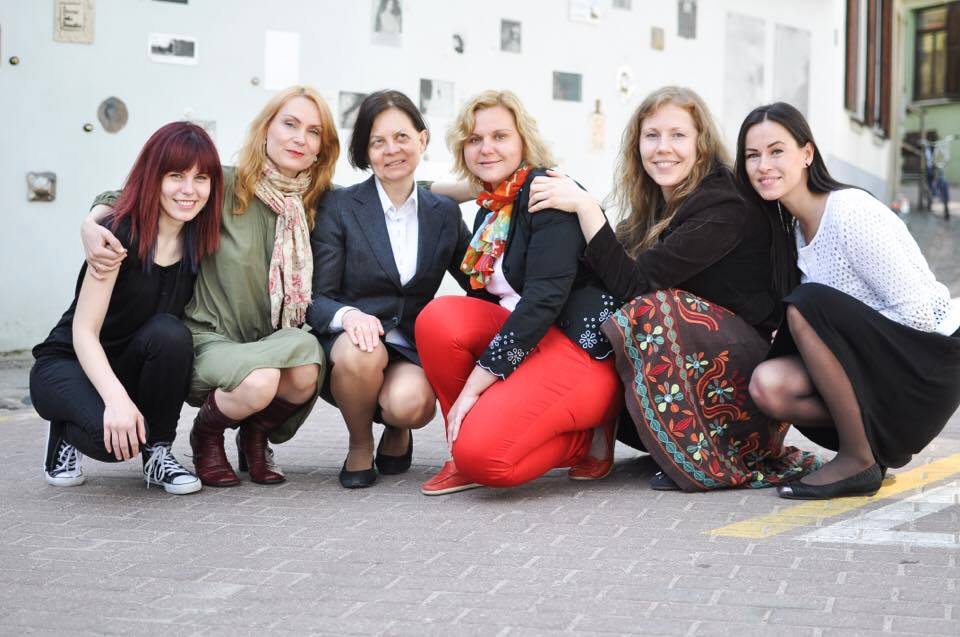
International Arena
Lithuanian framework of overcoming violence in the immediate surroundings was recognized as one of the most progressive in Europe by independent researchers.
On November 3-6, 2015, representatives from Vilnius Women’s House participated in the 3rd World Conference of Women’s Shelters in The Hague, The Netherlands. Zuzana Vasiliauskaitė, a member of Vilnius Women’s House delegation, had the honour to represent the European continent and speak during the opening ceremony together with representatives from other continents. Zuzana Vasiliauskaitė presented the framework for the Protection from Violence in Immediate Surroundings Law implementation, and provision of specialised help for the victims of domestic violence in Lithuania.
In 2015, the European Scientific Journal (vol.11, No. 26) published the article Help – Seeking and Perceived Helpfulness of Formal Help Sources for Victims of Domestic Violence: An Exploratory Study by Zuzana Vasiliauskaitė. The article analyses experiences of women seeking help from both governmental bodies and NGOs, as well as women’s evaluation of effectiveness of the provided help and support (2013 – 2014). All of those women reported that they have had more than once experienced institutional betrayal or disappointing responses from the institutions, while seeking protection from family violence. The study showed, that when women started cooperating with Vilnius SHC, they expressed higher rates of trust towards governmental bodies and their performance. All participants of the study stated the help and support from SHC have been the most effective.
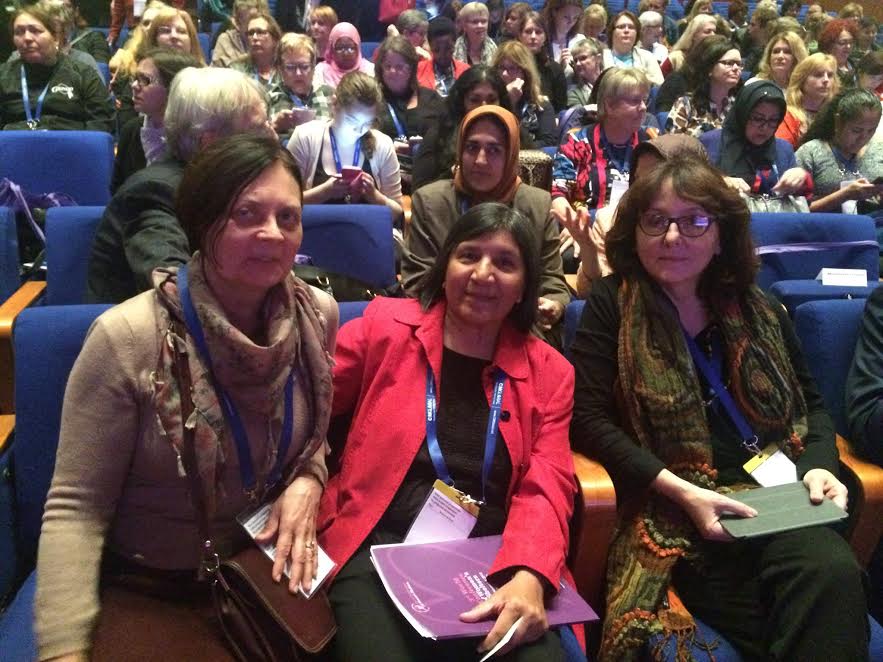
WAVE Step up! 2016-2017
In 2016, association Vilnius Women’s House actively joined the WAVE network campaign WAVE Step up! – #Stop Violence against Women! #Ratify the Istanbul Convention! encouraging the States to sign, ratify and implement CoE Convention. VWH calls to join the Campaign by taking picture with colleagues, family members, peers, associates or other members of the community while holding one of the posters that can be downloaded from our website vmotnam.lt, and upload the photos on one’s own Facebook profile following the hashtag. That way a person will express hers or his support for the most important objective of the civil society at the time being: to ratify the Istanbul Convention, European Council Convention on Preventing and Combating Violence against Women and Domestic Violence. Lithuania had signed the Council of Europe Convention in 2013, thus expressing its political will to implement one of the most advanced provisions in the area.
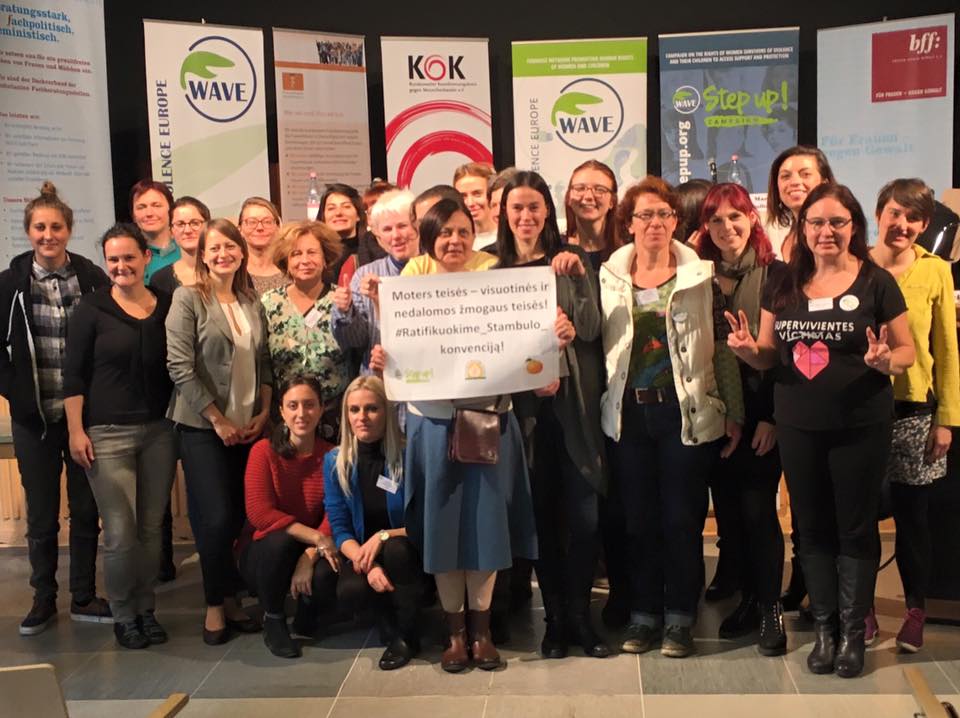
Celebrating our twentieth anniversary we would like to express our sincerest gratitude to all, who have contributed to implementation of the association’s Vilnius Women’s House ideas at all stages of their development. The greatest thanks we send to the persons that are listed below, though by no means the list is complete!
Anne Yomans, psychologist and the inspirer of the first women’s group in Lithuania; Elinor Gadon, cultural historian, promoter of Marija Gimbutienė’s works; Berit As, psychologist, professor at the University of Oslo, a prominent politician and inspirer of VWH Crisis Centre initiative; Rachel E. Paul, Senior Adviser to the Equality Ombudsman of the Kingdom of Norway; Gudrun Jonsdottir, the leader of the NGO Stigamot, Iceland; Sidsel Elie Aas, former head of Norway’s Crisis Centre Secretariat; Norwegian Government; Hanne Ytting, co-author of Vilnius Women’s House Volunteer Programme, organiser and coordinator of VWH volunteers’ study visits in Denmark; Rosa Logar, WAVE Content Manager; Maria Rösslhumer, WAVE Managing Director; Kęstutis Čilinskas, Head of United Democratic Movement, lawyer and human rights activist; Edita Milaševičiūtė, Coordinator of United Democratic Movement; Aušra Maldeikienė, economist and member of the Parliament of Lithuania; Ona Gražina Rakauskienė, economist, expert on gender economy; Marija Prokopčik, former head of CoE Information Office in Vilnius, Lithuania; Birutė Jatautaitė, Director of Civic Responsibility Foundation; Virginija Būdienė, former advisor to the President of the Republic of Lithuania; Gediminas Dalinkevičius and Arminas Lydeka, former chairs to Human Rights Committee at the Parliament of Lithuania; Eglė Gibavičiūtė, advisor to the Human Rights Committee at the Parliament of Lithuania; Members of the Parliament of Lithuania Dalia Kuodytė, Ona Valiukevičiūtė, Aušrinė Marija Pavilionienė; The founders and active members of the National NGO Coalition Women’s Rights are Human Rights Angelė Barauskienė, Daiva Baranauskė, Nijolė Meilutienė, Salomėja Jasudienė, Elvyra Laskaja, Regina Daukšienė Rozenblat, Diana Stankaitienė, Marytė Zabulionienė, Irma Zabulionytė, Stefa Naujokienė, Marina Zablockytė, Kristina Sinickaitė Belostockė, volunteers Gražina Smolenskienė, Asta Paulikaitė, Rūta Julija Klovaitė, Laima Stačiokienė, Gytis Mekionis, Nida Vildžiūnaitė, Diana Kipšaitė, Natalija Serova, Rokas Janauskas and others; Employees of Vilnius city Specialised Help Centre Elinga Zelionkaitė, Evelina Dirmotaitė, Zuzana Vasiliauskaitė, Luka Bareikytė, Germa Baltrūnaitė, Agnė Madeikytė, Šarūnas Ivanauskas, Dovilė Prunskaitė.
Our sincerest gratitude to each and every one of you for your support, for all the work done together, fruitful discussions, shared ideas and dreams, and common efforts to make them true!
In the name of Vilnius Women’s House team sincerely yours,
Lilija Henrika Vasiliauskienė
Celebrating its twentieth anniversary, association’s Vilnius Women’s House Crisis Centre unites a group of 14 team members: employees, specialists, and volunteers.
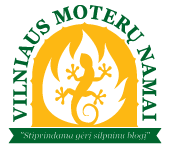
VILNIUS WOMEN’S HOUSE
Phone/Fax: +370 5 2616 380
E-mail: vmotnam@vmotnam.lt
https://www.facebook.com/Vilniaus.Moteru.namai/
Support the association Vilnius Women’s House by designating 2% of your income tax or by transferring your support to our bank account
Beneficiary code 193144736
Title: Association Vilnius Women’s House
Bank name: AB SEB bankas
SWIFT (BIC): CBVILT2X
Account: LT29 7044 0600 0106 4248
